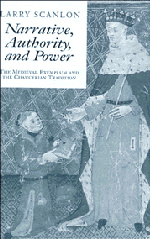Book contents
- Frontmatter
- Contents
- Acknowledgments
- INTRODUCTION: EXEMPLARITY AND AUTHORITY IN THE MIDDLE AGES
- PART 1 THE LATIN TRADITION
- PART 2 THE CHAUCERIAN TRADITION
- 6 Exemplarity and the Chaucerian tradition
- 7 Canterbury Tales (I): from preacher to prince
- 8 Canterbury Tales (II): from preaching to poetry
- 9 Bad examples: Gower's Confessio Amantis
- 10 The Chaucerian tradition in the fifteenth century
- Bibliography
- Index
10 - The Chaucerian tradition in the fifteenth century
Published online by Cambridge University Press: 16 September 2009
- Frontmatter
- Contents
- Acknowledgments
- INTRODUCTION: EXEMPLARITY AND AUTHORITY IN THE MIDDLE AGES
- PART 1 THE LATIN TRADITION
- PART 2 THE CHAUCERIAN TRADITION
- 6 Exemplarity and the Chaucerian tradition
- 7 Canterbury Tales (I): from preacher to prince
- 8 Canterbury Tales (II): from preaching to poetry
- 9 Bad examples: Gower's Confessio Amantis
- 10 The Chaucerian tradition in the fifteenth century
- Bibliography
- Index
Summary
One of the premises of this study has been that narratives depend on readers, and that this dependence is not only a formal property but also an historical condition. It may well be that Chaucer's innovations justify the ascription of his name to the tradition both he and Gower initiate. But it must not be forgotten that that ascription was not his accomplishment, but that of his fifteenth-century successors. In this chapter I examine the exemplum collections of the two most important of these successors, Thomas Hoccleve, and John Lydgate. I argue that they constitute not a regression, as they are conventionally viewed, but a consolidation. The most significant difference between Hoccleve and Lydgate and Gower and Chaucer, is that the later poets largely abandon the anti-clericalism that so marks the work of the earlier ones. This shift is not a matter of some simple resurgence of piety (in any case it is hard to imagine a poet more pious than Chaucer in his pious moments). It can be explained as a confluence of historical circumstances directly related to the politics of the emergent lay tradition. First, the Lancastrian royal court was becoming increasingly anxious about clerical orthodoxy, in the face of a growing Lollard threat. Second, lacking clear dynastic legitimacy, it needed ideological support from the Church that the Plantagenets had not.
- Type
- Chapter
- Information
- Narrative, Authority and PowerThe Medieval Exemplum and the Chaucerian Tradition, pp. 298 - 350Publisher: Cambridge University PressPrint publication year: 1994



